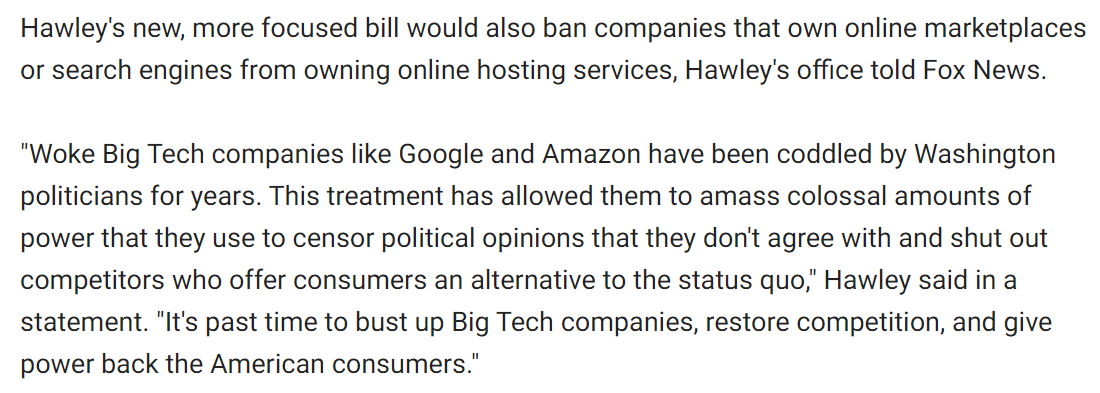
1/ Democrats want to stop websites from spreading hate speech, misinformation, etc
But this bill would do the opposite; it would do exactly what the Trump administration wanted—because @EnergyCommerce Dems still don't understand how #Section230 works
But this bill would do the opposite; it would do exactly what the Trump administration wanted—because @EnergyCommerce Dems still don't understand how #Section230 works
https://twitter.com/EnergyCommerce/status/1448669803749822469
2/ The bill would expose many websites to liability, both civil and criminal, for making recommendations. States will enforce existing laws & write new ones, and we'll spend years litigating them under the First Amendment
But that's not all the bill does...
But that's not all the bill does...

3/ The bill turns off (c)(1) protections "with respect to information" subject to a "personalized recommendation"
Thus, a website could be sued both for recommending content and also for trying to stop its spread once it's been "recommended" by automated, algorithmic processes
Thus, a website could be sued both for recommending content and also for trying to stop its spread once it's been "recommended" by automated, algorithmic processes
4/ This can't possibly be what the bill's Dem authors intended—because it's precisely what the Trump administration wanted
Republicans understood that (c)(1) is what protects content moderation in nearly all lawsuits. Dems *still* don't get it.
Republicans understood that (c)(1) is what protects content moderation in nearly all lawsuits. Dems *still* don't get it.
5/ MAGA Republicans want to limit (c)(1)'s application because they want to deter moderation (because they claim they're being "censored"). They've proposed countless ways of doing that, and forcing websites to rely on (c)(2)(A)'s much weaker shield
6/ Dems are now proposing exactly the same thing—presumably because they just don't understand that (c)(1) is the key part of #Section230 that allows websites to moderate content without fear of having to litigate expensive lawsuits
7/ (c)(1) makes it easy for a website to win a motion to dismiss: it need only show that it was not responsible for developing content. Moderating content has long been understood as a core editorial function, since Zeran (4th Cir. 1997) 

8/ (c)(2)(A) isn't so easy to use. A site must show it acted "in good faith"—a question of fact that many judges will insist on deferring to a motion for summary judgment. Plaintiffs will get to engage in discovery over that question.
9/ Multiply those costs by the number of suits, and you get the death by ten thousand duck-bites warned about in Roommates (9th Cir. 2008)
Anyone aggrieved by *not* having their content "recommended" (eg, shadow-banned) could sue and the sheer expense would discourage moderation
Anyone aggrieved by *not* having their content "recommended" (eg, shadow-banned) could sue and the sheer expense would discourage moderation

10/ In short, Republicans have long aimed to amend #Section230 to enable Strategic Lawsuits Against Moderation (SLAMs)
This new Democratic bill would do the same
Who would benefit? Those who use the Internet to spread hate speech and lies about elections, COVID, etc
This new Democratic bill would do the same
Who would benefit? Those who use the Internet to spread hate speech and lies about elections, COVID, etc
11/ This should be obvious to anyone who knows anything about #Section230
That the people who drafted this bill failed to see this perverse result makes clear that they simply don't understand how the law works
But then, basically no one (in any position of power) does either🤦♂️
That the people who drafted this bill failed to see this perverse result makes clear that they simply don't understand how the law works
But then, basically no one (in any position of power) does either🤦♂️
12/ Lots more to say about this, much of which @DaphneK lays out in this thread:
https://twitter.com/daphnehk/status/1448659644872679431
• • •
Missing some Tweet in this thread? You can try to
force a refresh






